Irakli Gharibashvili: “In terms of the lowest tax burden, Georgia is ranked in the 3rd position in the world.”
Verdict: FactCheck concludes that Irakli Gharibashvili’s statement is HALF TRUE.
The business tax burden indicator, to which Irakli Gharibashvili was referring, includes profit and property taxes. The profit tax rate in Georgia is 15% although it is 0% in the case of the reinvestment of profit. The relevant amendments to the Tax Code came into effect from January 2017. Property tax is a local tax and its rates differ across municipalities, although the top rate for property tax is 1% of the property’s value.
Ultimately, the business tax burden (taxes paid after all possible preferences) based on most recent and publicly available data is 9.9% and Georgia is ranked in the 3rd position with this indicator. Therefore, the Prime Minister’s statement is true in this part, although it is wrong when portraying the progress as something that has been achieved only in the last decade. In fact, reforms to reduce the business tax burden were much more extensive under the previous government and Georgia’s rating in terms of lower taxes jumped from the 158th position to the 14th position in 2005-2012 and the rate itself dropped from 57% to 16.5%.
Given these circumstances, FactCheck concludes that Irakli Gharibashvili’s statement is HALF TRUE.
Analysis
On 23 October 2023, in his speech at the Silk Road Conference in Tbilisi, the Prime Minister of Georgia, Irakli Gharibashvili, talked about to lesser tax burden and the ease of doing business in Georgia: “Over the past decade, we have managed to make Georgia one of the best places to do business in the world.Of note is that Georgia has one of the lowest tax rates in the world.According to the World Bank, Georgia ranks 3rd among the countries with the lowest tax burden with an average tax rate of 9.9 percent.”
The tax burden is measured by different methods: the total tax rate to the GDP ratio, taxes paid from income, taxes paid from profit, etc. In this case, Irakli Gharibashvili stressed the business tax burden which does not include those taxes which business itself does not pay and only ensures collection and record (VAT, excise tax, income tax). At the same time, it is not the tax rates that are taken into consideration with this specific indicator but the actual amount of paid taxes after the deduction of all possible preferences.
In accordance with current Tax Code of Georgia, the profit tax rate is 15% (Chapter XIII, Article 98). However, if a company will be exempted from this tax if it decides to reinvest its profit. The so-called Estonian model – initiated by the then Prime Minister Giorgi Kvirikashvili – came into effect from January 2017.
The World Bank statistics, mentioned by Irakli Gharibashvili, are based on the Ease of Doing Business ranking developed by the same organisation, although the World Bank stopped doing this survey in 2021.
According to the most current statistics published by the World Bank, which analyse the data of 2019, Georgia ranks 3rd after Brunei and Vanuatu with a rate of 9.9%. It is also true that it was achieved in the previous decade under the Georgian Dream’s rule because Georgia occupied the 14th position in 2012 with a 16.5% tax rate. However, of note is that the tax burden was sharply reduced twice in 2006 and 2009 under the previous government. In 2005, Georgia was in the 158th position with a tax rate of 57% and in the 81st position with 38.6% tax rate.
Graph 1: Business Tax Rate

Source: World Bank
The method of calculating business tax burden, to which the Prime Minister was referring, includes the profit and property taxes paid by companies. It does not include the largest VAT and excise taxes on some products (mainly automobiles, petroleum products, alcohol and tobacco products) nor does it include income tax that employers pay on behalf of employees. In the first draft of the 2024 budget, a total of GEL 18.3 billion is planned to be mobilised from taxes of which the share of the profit tax is only GEL 2.1 billion.
In 2017, after the transition to the so-called Estonian model when the tax on reinvested profits was abolished, the funds received from the profit tax in the budget decreased by GEL 300 million to GEL 765 million. However, to offset this, the excise tax increased and the volume of funds collected from excise increased by GEL 380 million to GEL 1.5 billion. In 2017, the excise tax rate on tobacco products, petrol and diesel was significantly increased. In the same year, inflation reached 6.7% which was largely attributable to the increase of the excise tax rate.
Although the share of profit tax is less than 12% in total taxes and the excise tax rate increased during the reform process, this is an expense that business pays after receiving profit as a result of its economic activity and which can be calculated separately from total taxes.
In regard to property tax, it is a local tax and its rates differ across municipalities, although the top rate for property tax is 1% of the property’s value.
Ultimately, the business tax burden (taxes paid after all possible preferences) based on most recent and publicly available data is 9.9% and Georgia is ranked in the 3rd position with this indicator. Therefore, the Prime Minister’s statement is true in this part, although it is wrong when portraying the progress as something that has been achieved only in the last decade. In fact, reforms to reduce the business tax burden were much more extensive under the previous government and Georgia’s rating in terms of lower taxes jumped from the 158th position to the 14th position and the rate itself dropped from 57% to 16.5% in 2005-2012.








